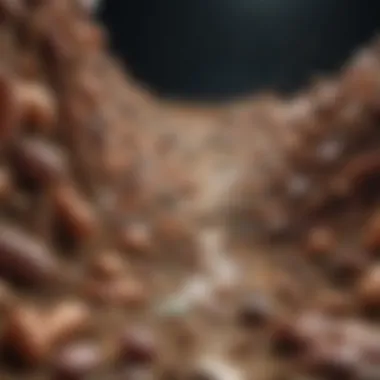Fecal Removal: Process, Impacts, and Techniques


Intro
Fecal removal is a fundamental process that plays a key role in maintaining health and safety for both humans and the environment. Understanding this process involves looking at biological functions, removal techniques, and their wider implications. This analysis is vital, as it goes beyond mere discipline-specific studies. It integrates aspects from biology, public health, and environmental science. Most importantly, it helps us understand how we can improve fecal management strategies.
Research Background
Overview of the scientific problem addressed
The issues surrounding fecal removal are multifaceted. Improper disposal can lead to numerous health dangers including the transmission of diseases. These diseases are often linked to pathogens present in fecal matter. Consequently, there is a growing need to find effective treatment and disposal methods. The risks make it essential for researchers and professionals in the field to continue investigating fecal management.
Historical context and previous studies
Historically, methods for fecal removal have evolved from primitive practices to advanced treatment facilities. Studies conducted in various parts of the world have shown the correlation between poor wastewater management and outbreaks of diseases such as cholera and dysentery. Previous research has also focused on effective sewage disposal methods, such as mechanical treatments and biological digesters. Each of these methods presents unique challenges and benefits. The historical context provides valuable lessons for modern practices.
Findings and Discussion
Key results of the research
Several key findings emerge from current studies on fecal removal. First, improving sanitation infrastructure drastically reduces health risks. For instance, regions implementing modern sewage systems observe a significant drop in disease incidence. Additionally, biogas production from waste treatment shows promise as a sustainable energy source.
Interpretation of the findings
Interpreting these results is crucial for policymakers and community planners. They highlight not only the need for effective fecal removal methods but also raise awareness about sustainable practices. As societies face increasing waste challenges, integrating eco-friendly technologies becomes imperative. The research emphasizes that the future of fecal removal is not just in tackling current issues but in innovating for sustainable solutions.
Effective fecal management is essential for public health and environmental sustainability.
Fecal removal might seem like a straightforward topic, yet its complexities invite rigorous exploration and innovative solutions. The landscape is evolving, and understanding these dynamics is crucial for healthcare, environmental protection, and community well-being.
Prelude to Fecal Removal
Fecal removal is a vital aspect of maintaining public health and hygiene. Understanding this process is critical in various fields, including medicine, environmental science, and waste management. The implications of fecal removal extend beyond mere sanitation; they touch on health, ecology, and even innovation in technology. This introduction sets the foundation for a comprehensive exploration of fecal management practices, as well as their consequences.
Definition and Importance
Fecal removal refers to the systematic process of eliminating waste products from the digestive system. This can occur naturally, through biological processes, or via artificial methods such as mechanized waste extraction. The importance of fecal removal cannot be overstated. Failure to manage feces adequately can lead to serious health risks, including the transmission of pathogens and the emergence of diseases. Furthermore, proper fecal disposal is essential for preserving environmental integrity. It prevents contamination of water sources and soil, thereby safeguarding ecosystems and public safety. In essence, fecal removal underpins both human health and ecological balance.
Historical Perspectives
The history of fecal removal is as old as civilization itself. Ancient societies developed various methods to manage waste, from simple pits to more sophisticated sewage systems. For instance, the Romans are known for their elaborate aqueduct systems that not only supplied fresh water but also drained waste effectively. Over time, the evolution of understanding regarding bacteria and sanitation led to more refined practices. The development of modern sewage systems in the 19th century marked a significant turning point in public health. These innovations reduced the incidence of diseases related to waste contamination, demonstrating the crucial role that effective fecal removal plays in health management. Today, as we face challenges such as urbanization and environmental concerns, revisiting historical practices can provide valuable insights into developing sustainable waste management solutions.
Biological Aspects of Feces
Feces play a vital role in understanding human biology and ecology. Analyzing the biological aspects of feces helps to uncover significant insights into digestion, metabolism, and overall health. The composition and characteristics of fecal matter contain information regarding an individual's health status, dietary habits, and gut microbiome. With an increased focus on wellness, the study of feces has become an essential area for researchers, nutritionists, and medical practitioners alike.
Composition and Characteristics


Feces primarily consist of water, undigested food, bacteria, cells shed from the intestinal lining, and various waste products. On average, about 75% of fecal matter is water. The remaining 25% includes a complex mixture of fibers, salts, dead bacteria, and metabolic waste.
The composition of feces can vary significantly between individuals based on diet, hydration, and health conditions. For example, a high-fiber diet generally leads to bulkier and softer stools, while a low-fiber diet may result in harder, more compact feces. Specific characteristics can reveal various health insights:
- Color: Normal feces can vary in color from light brown to dark brown. Abnormal colors like green, yellow, or black may indicate underlying health issues.
- Odor: Feces have a distinct odor caused by bacterial fermentation. However, a change in odor, such as a particularly foul smell, may suggest an infection or malabsorption problem.
- Consistency: Healthy fecal consistency is generally soft but formed. Serious conditions can lead to diarrhea or constipation, each reflecting different ailments.
Understanding the biological characteristics of feces can provide valuable indications of physiological changes and digestive health.
Role in Digestive Health
The role of feces in digestive health goes beyond mere waste disposal. Fecal matter reflects the state of the gastrointestinal tract and localizes disruptions in digestive processes. Regular bowel movements indicate a well-functioning digestive system, while irregularities may highlight issues such as malnutrition, infection, or inflammatory bowel diseases.
Moreover, feces serve as a medium for beneficial bacteria. The gut microbiota, which consists of trillions of microorganisms, plays a significant role in health. Imbalances can lead to dysbiosis, resulting in conditions ranging from obesity to autoimmune diseases. Fecal matter analysis can reveal the diversity and health of gut bacteria, which is essential for maintaining homeostasis in the body.
- Metabolism: Feces contain metabolic byproducts of bacteria that can influence nutrient absorption and immune function.
- Biomarkers: Certain compounds in feces, such as short-chain fatty acids, may act as biomarkers for gut health and overall metabolic processes.
Understanding the role of feces in digestive health is crucial for developing treatment strategies and promoting wellness. Therefore, ongoing research into the biological aspects of feces is not only relevant for scientific inquiry but also for practical applications in health management.
Methods of Fecal Removal
Understanding the methods of fecal removal is essential for various fields, including medicine, environmental science, and public health. The processes employed for fecal removal not only ensure sanitary conditions but also play a pivotal role in disease prevention and the maintenance of ecological balance. Different methodologies can greatly impact health systems, ecosystems, and even agricultural practices. Thus, exploring these methods provides insights into their significance, advantages, and considerations.
Natural Removal Processes
Natural removal processes refer to the mechanisms through which fecal matter is eliminated from biological organisms with minimal human intervention. This process primarily includes defecation in animals and the decomposition of organic material in nature.
- Defecation: In animals, the expulsion of feces is a crucial biological function. It helps eliminate waste and facilitate nutrient cycling within ecosystems. When animals deposit feces in various environments, it acts as a natural fertilizer, enriching soils with nutrients.
- Decomposition: This process involves the breakdown of fecal matter by microorganisms and other decomposers. Bacteria, fungi, and invertebrates play a significant role in converting feces into simpler substances, promoting soil health. Effective decomposition can reduce pathogens and nutrient runoff into bodies of water, thus protecting both water quality and ecosystem integrity.
Mechanical and Chemical Methods
Mechanical and chemical methods are widely employed in both clinical and environmental contexts to facilitate fecal removal. These techniques offer robust options where natural processes may be insufficient.
- Mechanical Methods: In clinical environments, mechanical methods are used to manually remove fecal matter, especially during surgeries or treatments for certain conditions. Systems like colonic irrigation utilize water pressure and suction, ensuring thorough cleaning of the bowel. This contributes to various medical procedures by minimizing contamination risks.
- Chemical Methods: Chemical agents play a crucial role in fecal management. For instance, disinfectants can be applied to surfaces and equipment that come into contact with feces, reducing microbial load. Additionally, chemical treatments may promote the breakdown of fecal matter in sewage systems or treatment plants. Chemicals like hydrochloric acid or various enzymes can enhance biodegradation, making waste treatment both effective and efficient.
Innovations in Technology
Advancements in technology have led to novel approaches in fecal removal. These innovations not only improve efficiency but also enhance safety and environmental compatibility.
- Smart Toilets: The advent of smart toilets equipped with sensors that analyze fecal matter is a significant innovation. These toilets can provide real-time health indicators and encourage better hygiene practices.
- Bioreactors: Bioreactor systems are an emerging solution for the treatment of fecal sludge in wastewater management. Utilizing natural microbial processes, bioreactors convert waste into useful by-products, thus minimizing environmental impact.
- Mobile Treatment Units: Portable treatment technologies are being developed to address fecal waste in disaster-relief scenarios or underserved areas. These units can treat and manage waste on-site, reducing logistical challenges and health risks associated with fecal exposure.
Health Implications of Fecal Removal
The process of fecal removal is critical not only for hygiene but also for public health. Understanding the health implications associated with fecal management can help prevent diseases. An improper approach can lead to outbreaks of infections that can be detrimental to both individuals and communities. Inadequate fecal disposal may facilitate the spread of pathogens and parasites, emphasizing the need for effective removal strategies. Moreover, the benefits of proper fecal removal extend to environmental health, enhancing the ecosystem and promoting sustainable practices.
Connection to Disease Prevention
Effective fecal removal has a direct link to disease prevention. The primary concern is how pathogens are transmitted through fecal matter. Diseases such as cholera, dysentery, and hepatitis A are often linked to contaminated water sources or inadequate sanitation systems. According to the World Health Organization, safe disposal of feces is essential to break the cycle of pathogen transmission.


Proper sanitation facilities and regular waste management practices can drastically reduce these risks. Some effective measures include:
- Regular sewage treatment: Increases water quality and reduces viral load.
- Education programs: Raise awareness about hygiene, thus reducing the incidence of fecal-oral diseases.
- Waste disposal regulations: Implementing strict guidelines can help ensure compliance and lower health risks.
Preventing diseases through effective fecal removal is essential for maintaining a healthy community. The presence of clean environments encourages people to engage in better sanitary practices, which ultimately contributes to public health.
Impact on Gut Microbiome
Fecal removal also has implications for the gut microbiome. The human gut hosts trillions of microorganisms, which play vital roles in metabolism, immunity, and overall health. A proper balance of these microbes is essential. Disruptions in fecal removal practices can lead to imbalances in the gut microbiome, contributing to various gastrointestinal disorders and other health issues.
Research has shown a significant connection between the gut microbiome and several health conditions, such as:
- Obesity: A disturbance in gut bacteria composition can affect metabolism.
- Irritable Bowel Syndrome (IBS): Associated with imbalances in gut flora.
- Autoimmune diseases: Gut health is increasingly recognized for its role in autoimmunity.
Effective fecal removal practices can support a diverse and healthy gut microbiome.
Ensuring that feces are properly managed not only protects individuals but also contributes to the maintenance of beneficial microorganisms in the gut. This underlines the importance of fecal management in both individual and public health contexts.
Environmental Considerations
Understanding environmental considerations in fecal removal is critical in both ecological and public health contexts. Proper management of fecal matter impacts ecosystems significantly, influencing not just local biodiversity, but also human health and agricultural productivity.
Fecal Matter Management in Ecosystems
Efficient fecal matter management is vital for maintaining ecological balance. When decomposed properly, fecal matter returns nutrients to the soil, fostering plant growth. However, if mismanaged, it can lead to environmental contamination, affecting water sources and harming wildlife.
Consider these points:
- Nutrient Cycle Disruption: If feces is not dealt with properly, essential nutrients such as nitrogen and phosphorus can disrupt local ecosystems. These nutrients may wash into water bodies, causing harmful algal blooms.
- Impact on Wildlife: Animals rely on healthy ecosystems for survival. Poor fecal management may lead to habitat degradation, affecting species diversity and population stability.
"Effective fecal management is a foundation of sustainable ecosystems; neglecting this can have dire consequences."
Technological innovations play a role in improving how fecal matter is managed. Advanced composting methods can help in breaking down waste safely while preserving its nutrient value.
Nutrient Recycling and Soil Health
Nutrient recycling from fecal matter is paramount for soil health. When treated correctly, it enriches soil, making it more fertile and productive. This recycling process adds organic matter, which enhances soil structure, leading to better water retention and aeration.
Key benefits include:
- Enhanced Soil Fertility: Through composting, fecal matter contributes essential elements that promote robust crop growth and agricultural outputs.
- Reduced Chemical Dependency: Utilizing natural fertilizers derived from fecal matter can reduce the need for synthetic fertilizers, minimizing environmental impact.
- Sustainable Agricultural Practices: Implementing fecal recycling trains farmers to adopt sustainable practices, ensuring long-term viability of food production.
Challenges in Fecal Removal
Fecal removal presents various challenges that are critical in understanding its broader implications in public health and environmental sustainability. Fecal matter, if not managed properly, can lead to significant health risks and logistical difficulties. Addressing these challenges is essential for developing effective fecal management systems. These systems play a key role in disease prevention, environmental protection, and public sanitation.
Public Health Risks


Improper fecal removal can pose serious public health risks. Pathogenic microorganisms found in feces, such as bacteria, viruses, and parasites, can contaminate water sources and lead to waterborne diseases. Examples include cholera and typhoid fever, which remain prevalent in many parts of the world where sanitation is inadequate. The transmission routes of these diseases are often linked to the fecal-oral pathway. It is crucial for communities to implement proper fecal management methods to minimize encounters with contaminated sources.
Regular monitoring and maintenance of waste disposal systems are important to mitigate these health risks. Additionally, public awareness campaigns aiming to educate people about the dangers of untreated fecal matter can encourage better hygiene practices. Initiatives such as improved latrine facilities in rural areas and the effective treatment of sewage in urban settings are essential in combatting these public health challenges.
Logistical Difficulties
The logistical difficulties involved in fecal removal are multifaceted and can be daunting. One significant issue is the infrastructure required for effective waste management. In many developing regions, lacking facilities, poorly maintained roads, and insufficient resources contribute to the inefficiency of existing systems. This results in delays and the ineffectiveness of scheduled waste removal.
Moreover, the transport and treatment of fecal matter require specialized equipment and trained personnel. Inadequate treatment facilities can lead to overflow situations during heavy rains, further aggravating the problem.
To tackle these logistical challenges, it's important to develop integrated waste management systems that are context-sensitive. Engaging local communities in identifying barriers and creating sustainable solutions can lead to improved practices. Prioritizing investment in infrastructure can have long-term benefits for both health and environmental outcomes.
Future Directions in Research
The exploration of fecal removal has significant implications for public health, environmental sustainability, and scientific advancement. As knowledge about the composition and role of feces evolves, so does the importance of future research in this field. Understanding the factors influencing fecal removal can lead to new breakthroughs in health practices and technological innovations. Investments in this research can also inform public policy and enhance community sanitation measures.
Emerging Technologies
Advancements in technology have reshaped various fields, and fecal removal is no exception. Emerging technologies are transforming how we manage waste, ensuring safer and more efficient processes. These technologies include:
- Smart Toilets: Equipped with sensors to analyze waste composition, these devices can monitor health indicators and detect abnormalities.
- Biodegradable materials: Research in creating eco-friendly materials for waste management can significantly reduce the environmental impact of conventional methods.
- Nanotechnology: Applications of nanotechnology may facilitate more efficient breakdown of waste and treatment of leachate, enhancing soil health and water quality.
Investing in these technologies promises to improve waste management practices broadly, contributing to both human health and ecological well-being. As research progresses, it will be crucial to consider the feasibility, cost-effectiveness, and scalability of these technologies in diverse settings.
"Innovative waste management technologies could dramatically reshape our approach to sanitation and public health."
Interdisciplinary Approaches
Fecal removal and its implications cannot be fully understood through a single lens. An interdisciplinary approach can lead to enriched perspectives and solutions. Collaboration across disciplines can facilitate:
- Public health studies: Integrating biostatistics with environmental science can yield insights into the health impacts of inadequate waste management.
- Ecological research: Understanding the role of feces in nutrient cycling requires knowledge from microbiology and soil science.
- Social sciences: Exploring community attitudes towards waste disposal can inform educational campaigns and policy making.
Combining expertise from various fields can create comprehensive frameworks that address the complexities of fecal removal. Such approaches not only aid researchers in formulating better strategies but also play a significant role in developing overlooked community-based solutions.
In summary, as we look towards the future, the continued exploration of fecal removal and its impacts should embrace emerging technologies and interdisciplinary collaboration. These directions promise not only to enhance our understanding but also to innovate effective practices in health and environmental sectors.
Finale
Fecal removal plays a pivotal role in both health and environmental sustainability. The discussions throughout the article have emphasized its multifaceted nature, examining biological importance, methodologies, and health outcomes. Each aspect underscores that fecal management is not just about disposal but involves understanding complex interactions in ecosystems.
Summary of Key Points
In summary, the article has covered several critical elements related to fecal removal:
- Biological Importance: Fecal matter provides insight into health indicators and dietary efficiency.
- Methods of Removal: Various techniques such as natural, mechanical, and chemical methods were discussed, highlighting innovation in technology.
- Health Implications: The impact of fecal removal on human health, including its connection to disease prevention and gut microbiome functions, was presented.
- Environmental Considerations: Effective management practices contribute to nutrient cycling and soil health, emphasizing sustainability.
- Challenges: Public health risks associated with inadequate fecal removal and logistical issues were critically examined.
- Future Directions: Innovative research and interdisciplinary approaches suggest an ongoing evolution in this field.
Call for Continued Research
The need for continued research cannot be overstated. As we face changing environmental conditions and health challenges, understanding fecal removal processes is crucial. Areas requiring further exploration include:
- Emerging Technologies: Investigate new methods and technologies that may improve efficiency and effectiveness of fecal management.
- Health and Microbiome: More studies should focus on how different approaches to fecal removal influence the gut microbiome and overall health outcomes.
- Policy Development: Research related to health policies and sanitation practices will ensure better compliance and public health outcomes.
Continuing this research will not only advance scientific understanding but will also inform public health policies, ultimately leading to better health and environmental quality.







